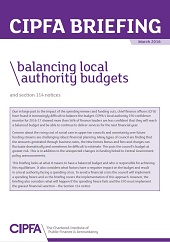Information on what it means to have a balanced budget, who is responsible for achieving this, and what factors have a negative impact.
Due in large part to the impact of the spending reviews and funding cuts, chief finance officers (CFO) have found it increasingly difficult to balance the budget. CIPFA’s local authority CFO confidence monitor for 2016/17 showed more than 56% of finance leaders are less confident that they will reach a balanced budget and be able to continue to deliver services for the next financial year.
Concern about the rising cost of social care in upper tier councils and uncertainty over future funding streams are challenging robust financial planning. Many types of council are finding that the amounts generated through business rates, the New Homes Bonus and fees and charges can fluctuate dramatically and sometimes be difficult to estimate. This puts the council’s budget at greater risk.
This CIPFA Briefing looks at what it means to have a balanced budget, what factors have a negative impact on the finances, the impact of a spending freeze and what happens if a Section 114 notice is implemented.

This CIPFA Briefing looks at what it means to have a balanced budget and who is responsible for achieving this equilibrium. It also considers what factors have a negative impact on the budget and result in a local authority facing a spending crisis.
Download the Balancing Local Authority Budgets report (PDF 300Kb)
More on Section 114s
These resources help you navigate Section 114s, offering advice and guidance.
